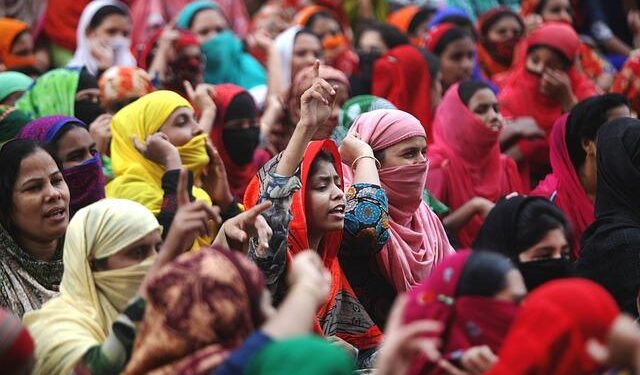On March 18, a significant wave of public dissent swept through the streets of Tel Aviv as tens of thousands of demonstrators rallied against the Israeli government’s contentious efforts to remove high-ranking officials, including the Attorney General and the chief of the Shin Bet security agency.The protests, which unfolded amidst an increasingly polarized political landscape, reflect widespread concern over perceived attempts to undermine judicial independence and institutional integrity. As citizens voiced their opposition to the government’s actions, the demonstrations marked a pivotal moment in Israel’s ongoing debate about governance, accountability, and the protection of democratic principles. This article delves into the motivations behind the protests, the responses from government officials, and the broader implications for Israeli democracy.
Protests Erupt in Tel Aviv Over Government Actions Against Key Officials
A significant wave of dissent swept through Tel Aviv as demonstrators filled the streets, gathered in a show of solidarity against the government’s controversial maneuvers aimed at dismissing notable officials, including the Attorney General and the head of shin Bet. Many participants carried placards that voiced their frustration with government overreach and the perceived erosion of democratic norms. As the crowd shouted slogans advocating for justice and accountability, the somber atmosphere was punctuated by the vibrant energy of the protesters, reflecting widespread concern over the implications of such actions on the rule of law.
Hashtags and social media tags quickly began trending as citizens mobilized behind the cause, showing the power of grassroots activism in the digital age. among the key themes emerging from the protests were:
- Demands for openness in government actions
- Calls to uphold judicial independence
- Concerns about national security and civil liberties
The gathering not only emphasized the urgent call for political accountability but also illustrated a broader commitment to safeguarding democratic institutions. Estimates suggest that as many as 200,000 protesters participated, making it one of the largest demonstrations in recent history, underscoring the citizens’ resolve to resist governmental encroachments on civil liberties.
Background on the Government’s Bid to Dismiss the Attorney General and Shin Bet chief
The recent attempts by the government to dismiss both the Attorney General and the head of the Shin Bet have stirred significant controversy and public dissent. Critics argue that these efforts are part of a broader strategy to undermine judicial independence and curb accountability within the government. The Attorney General, noted for his role in high-profile corruption cases involving government officials, is seen as a critical check against potential abuses of power. Simultaneously occurring, the Shin Bet chief’s dismissal raises alarms about national security oversight and the protection of civil liberties, with opponents warning that such changes could jeopardize the nation’s democratic foundations.
As tensions escalated, tens of thousands took to the streets of Tel Aviv in protest. Demonstrators raised their voices in support of maintaining judicial integrity and preserving democratic norms, emphasizing the critical need for an independent legal system that can operate free from political pressures. the protest highlighted a few key demands from the public:
- Protection of Judicial Independence: Ensuring that legal institutions operate without interference from political entities.
- Accountability for government Actions: Reinforcing mechanisms that hold public officials responsible for their conduct.
- Public Security Assurance: Maintaining robust oversight over the Shin Bet to safeguard civil rights while ensuring national security.
public Sentiment: Voices from the Streets of Tel Aviv
The streets of Tel Aviv echoed with the chants of tens of thousands who gathered to voice their opposition against government actions perceived as threats to judicial independence. Protestors expressed urgent concerns regarding efforts to dismiss the Attorney General and the head of the Shin Bet,framing these moves as attempts to undermine democratic norms and accountability.The atmosphere was charged, as demonstrators held signs and banners calling for transparency and rule of law, emphasizing the necessity of an independent judiciary in safeguarding civil liberties.
Voices from the crowd painted a vivid picture of public sentiment, with many citizens articulating a deep sense of urgency and frustration. Among the key themes highlighted were:
- The Importance of Democratic Institutions: Protestors voiced concerns that weakening judicial oversight could lead to unchecked government power.
- Unity Across Ideologies: many demonstrators, nonetheless of political affiliation, stood together, illustrating a common belief in protecting democratic values.
- Calls for Accountability: Citizens demanded that those in power be held accountable, showcasing the belief that public trust in state institutions is paramount.
Analyzing the Implications of Potential Leadership Changes in Law Enforcement
The ongoing protests in Tel Aviv represent a significant moment for law enforcement leadership, especially concerning the potential ousting of key figures such as the Attorney General and the Shin Bet chief. Changes in these positions could have far-reaching implications for public trust in the justice system and overall governance. A shift in leadership might lead to:
- Diminished accountability: New leaders may alter current policies, impacting how cases are prosecuted and investigated.
- Changes in national security strategies: Different leadership could result in a reevaluation of operational priorities for intelligence and counter-terrorism efforts.
- Public perception: If citizens perceive leadership changes as politically motivated, it may erode trust in institutions overall.
Moreover, these changes could also influence recruitment and retention within law enforcement agencies. If the new leaders implement drastic reforms or shifts in focus, officers may feel uncertain regarding their roles and responsibilities. An analysis might reveal compelling trends such as:
| Potential Changes | Impact on Law Enforcement |
|---|---|
| New Leadership style | variation in prioritization of community policing vs. aggressive tactics |
| Policy Overhauls | Potential adjustments in use of force regulations |
| Shift in Funding | Changes in resource allocation affecting service delivery |
The Role of the Attorney General and Shin Bet in Israeli Democracy
The Attorney General and the Shin Bet (Israel Security Agency) play pivotal roles in safeguarding the democratic framework of Israel. The Attorney General serves as the government’s legal advisor, but their responsibilities extend far beyond mere counsel. They are tasked with upholding the rule of law, ensuring that governmental actions align with legal and ethical standards. this role has taken on heightened importance in the context of recent protests, reflecting citizens’ concerns over potential political interference that could jeopardize judicial independence.
Meanwhile, Shin Bet’s role encompasses national security and intelligence operations, acting as a bulwark against threats ranging from terrorism to internal subversion. The agency’s operational conduct must resonate with democratic values, focusing on the protection of civil liberties while ensuring public safety. A partnership between the Attorney General and Shin Bet is critical; it reinforces the principles of accountability and transparency within a democracy. The recent protests underscore the public sentiment that any attempt to undermine these institutions could lead to significant erosion of democratic norms within Israeli society.
Historical Context: Protests as a Response to Government Overreach
The recent demonstrations in Tel Aviv, where tens of thousands gathered in opposition to government attempts to remove key figures from the legal establishment, mark a significant moment in the ongoing struggle between state authority and civil rights. Protests have historically served as a crucial avenue for citizens to voice dissent against perceived government overreach, fostering dialog and accountability. The movement draws parallels to previous historical instances where public outcry has swayed government policies and safeguarded democratic institutions. Events like the 2011 social protests in Israel and the global responses to issues such as police brutality and authoritarian rule illustrate the potent role of grassroots mobilization in challenging executive authority.
The current unrest reflects profound concerns among citizens regarding the independence of judicial processes and checks on power. Many participants express fears that undermining the role of the Attorney General and the Shin Bet chief could pave the way for increased impunity and less transparent governance. Notably, such protests are not isolated incidents; they resonate with global themes of democracy and accountability, including the following significant instances of civic engagement:
- The Black Lives Matter Movement: Highlighting systemic racial injustices and demanding police reform in the United States.
- The Arab Spring: A wave of protests across the Middle East seeking democratic reforms and governmental transparency.
- Brexit Protests: Demonstrators rallying against the government’s approach to UK withdrawal from the EU.
Strategies for Peaceful Protest: Lessons from Past Movements
Historical movements for social change have taught us valuable lessons on the efficacy of peaceful protest. First, when organizing a demonstration, clarity of purpose is essential. Movements that have been triumphant, such as the Civil Rights Movement in the United States, were anchored by clear, relatable goals that resonated with the public.Second, coalition-building can amplify voices. Engaging with various community groups ensures broader support and diversity of perspective.Uniting different factions around a common cause can create a more compelling narrative and attract more participants.
Additionally,strategic communication plays a critical role in peaceful protests. Utilizing social media for outreach and updates can rally more support and provide real-time data.moreover, diversifying protest tactics, whether through sit-ins, rallies, or peaceful marches, keeps the movement dynamic and engaging, appealing to a wider audience. The sit-ins of the 1960s or the Women’s March demonstrate how varied approaches can capture media attention and public interest. By learning from past movements, contemporary protests can harness these strategies to effectively convey their messages and inspire change.
Recommendations for Government Transparency and Accountability
To uphold democracy and reinforce public trust, it is crucial for governments to implement systematic measures aimed at improving transparency and accountability. Open data initiatives should be prioritized, allowing citizens access to key information regarding government spending, decision-making processes, and public sector performance. this can be achieved through:
- Regular public reports: government agencies should produce and publish complete reports detailing their activities, budgets, and outcomes.
- Accessible platforms: Develop user-friendly online platforms that compile all relevant governmental data, ensuring it is easy for citizens to navigate and understand.
- Public consultations: Encourage citizen participation in policymaking through town halls and feedback sessions, allowing the public to voice concerns and contribute ideas.
additionally, establishing independent oversight bodies can substantially enhance accountability. These watchdog organizations should be empowered to monitor government actions and are essential for ensuring the integrity of officials. A proposed framework could include:
| Oversight Body | Key Functions |
|---|---|
| Independent Audit Agency | conduct annual financial audits of government agencies. |
| Ethics Commission | Oversee ethical conduct of public officials and investigate allegations of misconduct. |
| Citizen Advocacy Group | Serve as a liaison between the public and the government, ensuring citizen concerns are addressed. |
Future of Israeli Politics: What this Means for Democracy and Governance
The recent protests in Tel Aviv have raised critical questions about the future of governance in Israel, signaling a palpable unease among citizens regarding the government’s intentions. Tens of thousands rallied against proposed actions to undermine key positions such as the Attorney General and the Chief of Shin Bet,indicating a significant backlash against perceived attempts to concentrate power without accountability. This movement is not merely about specific personnel but represents a broader concern over the erosion of democratic norms and the balance of power within the Israeli political landscape. The demonstrations reflect a strong societal commitment to protecting democratic institutions,which voters perceive as essential for safeguarding civil liberties and a transparent governance process.
As Israel moves forward, the implications of these developments are profound. A few key points emerge regarding its impact on democracy and governance:
- Increased civic engagement: The protests may inspire a new wave of political activism and vigilance among citizens.
- Legal challenges and reforms: Heightened scrutiny on governmental actions could lead to legal confrontations, possibly triggering reforms aimed at preserving checks and balances.
- Polarization of public opinion: The deepening divides could lead to intensified political polarization, affecting future elections and policy-making processes.
These factors, among others, are likely to shape a future where engagement and oversight become paramount for the health of democracy in Israel. A consolidated response from civil society and political factions will be crucial in ensuring that governance remains accountable to its citizens,fortifying democratic principles amid rising challenges.
Calls for Unity: Bridging Divides in a Polarized Political Landscape
In a striking demonstration of civic engagement, tens of thousands of protesters gathered in Tel Aviv to voice their dissent against the government’s attempts to dismiss key judicial figures, including the Attorney General and the head of Israel’s Shin Bet security agency.This rally,among the largest in recent memory,highlighted a growing concern over potential governmental overreach and the implications it could have for the rule of law and democratic norms. Many participants held placards bearing slogans advocating for justice and accountability, showcasing a collective effort to safeguard democratic institutions. The atmosphere was charged with passion as citizens from various backgrounds united to protect their legal framework.
The gathering served not only as a protest but also as a reminder of the fractures within the society, encouraging dialogue on how to bridge these divides. Attendees expressed a desire for political leaders to prioritize inclusivity and foster discussions that can heal the growing rifts. key themes emerging from the crowd included:
- Resistance to Authoritarianism: A strong desire to resist any moves that could lead to a concentration of power.
- Commitment to Rule of Law: The belief that a healthy democracy relies on an independent judiciary.
- unity in Diversity: The notion that different political perspectives can coexist and enrich public discourse.
As the political temperature rises, many hope that such mobilizations can inspire meaningful dialogue across ideological lines, creating pathways for cooperation rather than conflict. Addressing the deeply entrenched divisions is essential if the country aims to move forward collectively, ensuring that its democratic ideals remain intact.
In Retrospect
the protests that unfolded in Tel Aviv on March 18 represent a significant moment in Israel’s ongoing discourse over government accountability and the rule of law.With tens of thousands of demonstrators rallying against proposed measures to dismiss key figures in the country’s legal framework, including the Attorney General and the Shin Bet chief, the event underscores widespread public concern regarding the potential erosion of institutional independence. As tensions rise and debates continue, the implications of this protest reach far beyond the streets of Tel Aviv, highlighting critical issues of governance, civil rights, and democratic integrity in Israel.As the government navigates these challenges, the response from the public will likely play a pivotal role in shaping the future of its judicial landscape.















